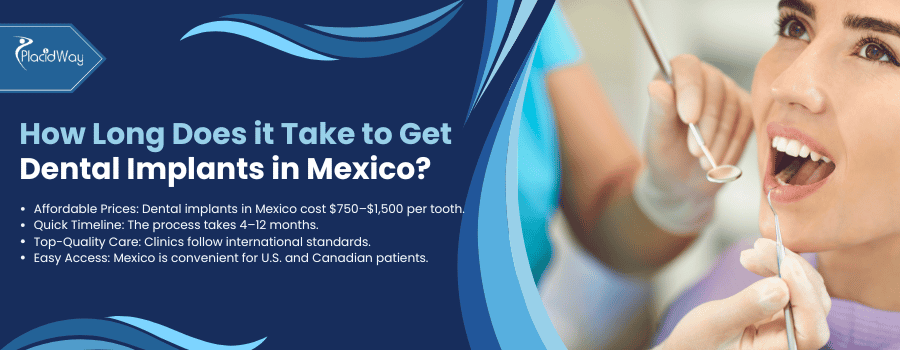Affordable & Efficient: Mexico Dental Implant Durations

Dental implants offer a durable and natural-looking solution for missing teeth, and Mexico has become a popular destination for these procedures due to competitive pricing and high-quality care. The total time it takes to get dental implants in Mexico can vary significantly, typically ranging from a few months to over a year, depending on individual needs and the complexity of the case. This timeframe includes initial consultations, surgical procedures, healing periods, and the final placement of the dental prosthesis.
How many visits are typically required for dental implants in Mexico?
"Most patients undergoing dental implant procedures in Mexico will require two to three visits spread over several months to complete the entire treatment."
The standard dental implant process in Mexico usually involves multiple stages, necessitating more than one trip. The first visit typically involves the initial consultation, diagnostics, and the surgical placement of the implant post. The second visit, after a crucial healing period, is for the attachment of the abutment and the final crown or prosthesis. In cases requiring additional preparatory procedures like bone grafts, a third visit might be necessary.
What are the main phases of dental implant treatment in Mexico?
"The main phases of dental implant treatment in Mexico include an initial diagnostic and planning stage, the surgical placement of the implant, a healing period for osseointegration, and finally, the restoration phase where the crown or bridge is attached."
Each phase is critical to the success of the dental implant. The initial phase involves comprehensive oral examinations, X-rays, and sometimes CT scans to assess bone density and plan the exact placement of the implants. The surgical phase involves implanting a titanium post into the jawbone. Following this, the osseointegration period allows the implant to fuse with the bone, creating a stable foundation. The final phase involves attaching the abutment, which connects the implant to the custom-made crown, bridge, or denture.
How long does the surgical placement of dental implants take in Mexico?
"The surgical placement of a single dental implant in Mexico typically takes 45 minutes to an hour, while multiple implants or full-mouth procedures can take several hours to half a day."
This is the active surgical time. Patients are often advised to stay in Mexico for a few days (2-7 days) after the surgery to allow for initial healing, suture checks, and to address any immediate post-operative concerns before returning home. This short stay ensures that the initial recovery is smooth and monitored by the dental team.
What is osseointegration and how long does it take for dental implants in Mexico?
"Osseointegration is the critical biological process where the dental implant fuses with the jawbone, and it typically takes 3 to 6 months to complete for dental implants in Mexico."
This healing period is vital for the long-term success and stability of the implant. During osseointegration, the titanium implant becomes a permanent and strong anchor for the future prosthetic tooth. Patients usually wear temporary prostheses during this time to maintain aesthetics and function. The duration of osseointegration can be influenced by individual healing capabilities, bone quality, and the specific type of implant used.
How does a bone graft affect the dental implant timeline in Mexico?
"If a bone graft is necessary before dental implant placement in Mexico, it can add an additional 4 to 8 months to the overall treatment timeline, as the graft needs to heal and integrate with the existing bone before the implant can be placed."
Bone grafting is performed when a patient's jawbone lacks sufficient density or volume to support an implant. This procedure, which can involve using bone from the patient's own body, a donor, or synthetic materials, requires its own healing period. This ensures a strong and stable foundation for the dental implant, but it does extend the total treatment duration.
What is the recovery time after dental implant surgery in Mexico?
"Immediate recovery from dental implant surgery in Mexico typically involves 2 to 3 weeks for soft tissue healing, with most discomfort subsiding within the first few days to a week."
While the implant itself will take months to fuse with the bone, the initial surgical site discomfort, swelling, and bruising usually resolve relatively quickly. Patients are generally able to return to work or light activities within 2-3 days, though strenuous physical activity should be avoided for about a week. Dentists will provide specific post-operative care instructions, including dietary recommendations and oral hygiene practices, to ensure a smooth recovery.
Are "same-day" or "immediate load" dental implants available in Mexico, and how do they affect the timeline?
"Yes, immediate load dental implants, also known as "same-day" implants, are available in Mexico, which significantly shortens the timeline by allowing a temporary crown or bridge to be placed on the implant immediately after surgery, reducing the overall number of visits."
While this option offers immediate aesthetic and functional benefits, it is not suitable for all patients. It requires sufficient bone density and stability of the implant at the time of placement. Even with immediate loading, the underlying osseointegration still needs to occur over several months, and a final, permanent restoration will typically be placed after this healing period.
How does the number of implants affect the total treatment time in Mexico?
"While the surgical time for multiple dental implants in Mexico will be longer than for a single implant, the overall healing and osseointegration period remains largely similar, though the complexity of the case may necessitate more follow-up appointments."
Whether you need one implant or several, the biological process of osseointegration for each implant post generally takes the same amount of time. However, complex cases involving multiple implants, full arch restorations (like All-on-4 or All-on-6), or extensive bone grafting might require more meticulous planning, longer surgical sessions, and potentially more intermediate visits for adjustments and evaluations.
What factors can prolong the dental implant treatment duration in Mexico?
"Several factors can prolong the dental implant treatment duration in Mexico, including the need for bone grafting, existing gum disease or infections that require pre-treatment, poor overall health, smoking, and insufficient oral hygiene during the healing phases."
Any pre-existing oral health issues, such as active periodontal disease, need to be addressed and resolved before implant placement, adding to the timeline. Smoking significantly impairs healing and can increase the risk of implant failure, thus potentially prolonging the process. Maintaining excellent oral hygiene throughout the treatment is crucial for successful integration and to prevent complications.
How often do I need to visit the dentist in Mexico for dental implants?
"After the initial surgical visit for dental implants in Mexico, patients typically need to return for a second major visit 3 to 6 months later for the final restoration, with some clinics offering virtual follow-ups or requiring an additional short visit for abutment placement."
The exact number of visits can vary based on the treatment plan and the specific clinic. Some clinics in Mexico offer streamlined processes to minimize travel, while others may prefer more in-person check-ups. It's always best to discuss the full treatment schedule and expected visits during your initial consultation.
What is the role of temporary teeth during the dental implant process in Mexico?
"Temporary teeth are often placed after dental implant surgery in Mexico to provide immediate aesthetics and some function while the permanent implants are healing and osseointegrating with the jawbone."
These temporary prostheses prevent you from having visible gaps and allow you to maintain a relatively normal diet and speech during the months-long healing period. They are not designed for heavy chewing and serve as a placeholder until the permanent crowns or bridges can be securely attached.
Can I travel immediately after dental implant surgery in Mexico?
"While you can generally travel after dental implant surgery in Mexico, it is highly recommended to stay in the country for at least 2 to 7 days post-surgery for initial recovery and a follow-up check with your dentist to ensure no immediate complications arise."
This short recovery period in Mexico allows for monitoring of swelling, pain management, and removal of any stitches if necessary. Most patients feel well enough to travel back home within a few days, but it's important to avoid strenuous activities and follow all post-operative instructions carefully.
Explore PlacidWay for comprehensive solutions related to medical tourism and healthcare services.


.png)







.png)






Share this listing